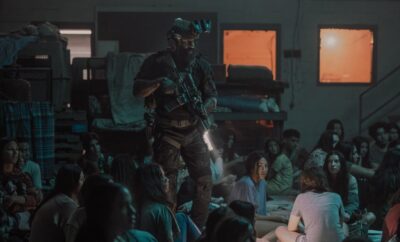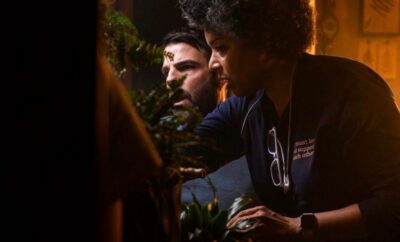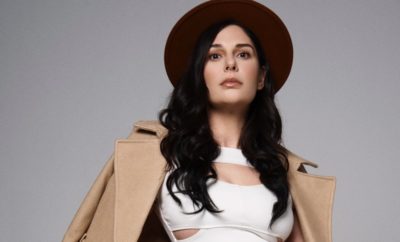Interviews
Aunjanue Ellis – When They See Us
By: Jamie Steinberg
Q) What are the recent projects that you are working on?
A) I’m in “When They See Us,” which is the Netflix series on The Central Park Five that Ava DuVernay wrote and directed. I’m working on “Lovecraft Country,” which is Misha Green produced for HBO. I’m in Atlanta now, working on that.
Q) How familiar were you with The Central Park Five before working on “When They See Us?”
A) I had a very superficial knowledge of it. When I came to New York I had the sort of knowledge that anyone would have about it if they had not been living in New York City. I wrongly believed that they were guilty because that was essentially what the city of New York wanted everyone to believe. My experience of meeting these young men (who were boys when this happened) and meeting their mothers has been extraordinary and eye opening.
Q) What kind of research did you do in order to portray Sharon Salaam?
A) I talked to her. She was around the set. So, because she was present, I was able to get instant consultation about her. I wasn’t trying to mimic her. I didn’t approach the job in that way. I just wanted to honor her experience as well as I could and as much as I could.
Q) What did you find challenging then about your portrayal?
A) I think any time you portray someone who is actually a living human being…Any time you portray someone who is a historic figure that’s challenging because folks have a reference for that person, particularly if that person has been archived on television and film. So, you can bring that baggage with you when you try to recreate their lives on screen. I try not to do that as much as I can. With her, what I think was most important was to honor what she went through. It destroyed her life and I think she still is still very much in pain about what happened to her and what happened to her son.
Q) Was there something you were surprised to learn about her or the process she went through to help her son?
A) Each one of the families brought to that tragedy or essentially what was a kidnapping – their children were kidnapped by the city of New York. That’s what happened. So, each family brought to the experience a different sort of memory, a different sort of history and a different sort of background. Sharon was from Alabama is from Alabama and she shared she had this history of Civil Rights activism. That was very, very strong in her community where she was from in Alabama. When that happened to her son Yusef she brought that same sort of sensibility to the fight for her son. What is interesting and what was interesting when it happened was because these families were so different and there was sort of inevitably this clashing of approaches in strategies in order to get their kids to be free again – to liberate their kids. I felt that her background…She didn’t just come to this as, “This is happening to my son,” but she came to it with a sort of position of this can happen to all of our sons and what do we do as citizens of our country to ensure this doesn’t happen to anyone ever again. It wasn’t just about Yusef for her. It was a much larger approach for her.
Q) How did you shake off a long day of filming?
A) I was fine. For me, when I do things like that (for the most part) … I’ve had situations where it was hard; when it became like there was no difference between me and the character I was playing and I was too immersed in it and it was unhealthy. But I was younger then. I’ve tried to approach work in a different sort of way. But I feel like when play these characters, I play these characters whose lives being told on screen is sort of an act of restorative justice. And that’s what I feel like with this project. It’s an act of restorative justice. The city of New York still hasn’t done what they should have done to these young men and for these young men. It goes beyond the money of it and the settlement that they got. It’s far more important than that. So, this is a part of that debt that we owe these young men for what they went through. So, I feel when I get to play a character like that who is involved in an act or project of doing something like that that I think is so significant it’s like a dream for me so it doesn’t feel like that. I feel like I can do something that matters to me and when I’m done working, I feel good.
Q) Talk about working with director Ava DuVernay.
A) I have a lot of respect for Ava. First of all, not a lot of directors would choose to do a lot of projects like this in the first place and I don’t think she wants to do this kind of work. This is where she lives in her life. It’s telling these kinds of stories. So, I have a great deal of respect for her for that from the jump. Then, you add on to that she is also, I believe, a great artist. Because you can have the right heart and have the right sort of zeal behind wanting to tell the stories you want to tell, but then you’re not necessarily an artist and it’s not going to be executed well. People aren’t going to feel it. I think that is what she has. She is an artist and she has a passion and her heart and soul are in the right place. I used the opportunity while I was working with her just to watch how she handled her set, to watch how she handled her actors and the people who are in her crew and I learned a great deal from her. I still can’t believe she wanted to cast me in this. So many people, I’m sure, wanted to play this. I am so glad she asked me. It’s just a great opportunity to be able to work with her.
Q) What advice did she offer you while filming that you took to heart?
A) I don’t feel like I’ve mastered acting, by any means of the imagination or measure at all. I am a student of it and when I go on set, I’m learning still from everybody. Certainly when she was directing me and directing other people. She talked about simplicity. She talked about you have an idea about how you want to do something then do it, but cut it down by ten. It’s just things like that. That kind of stuff stays with me.
Q) What do you hope viewers take away from watching “When They See Us?”
A) Well, what I hope is that people will know what happened to these young boys. What Ava did, which I think was essential, is she cast these young boys appropriately. I think the way that this country sees black men is that they either infantilize them and see them as boys, which is how they have been called – “boys.” The flip side to that, in the act of stripping them of their humanity, they are either infantilized, called “boys” or deemed or seen as men – even when they are not men at all. So, these young men that she cast as the men who were arrested you see how young they are. They look like babies. They look like babies! They were babies. They were young boys. Being accused of these heinous things and none of them were involved in it after all – not at all – they were just stripped from their families and stripped of their humanity. I hope people when they see this, when they see these young men, they will see that this can happen and it still does happen now. This is not just a failure of the city of New York. It’s a failure of the justice system of the United States of America and it has to change.
Q) You are a part of social media. Are you looking forward to the dialogue and discussion this series will open up?
A) No. I really don’t engage on social media at all. We have a Twitter page to discuss issues that are going on in Mississippi, but I stay away from social media. I know there are people who are working other projects who have a tremendous amount of followers. I’m excited about that. I’m excited about folks engaging with them like Niecy Nash and Michael K. Williams. It’s a lot of great people who are in the series and Ava, herself, has a tremendous following. It’s going to be fascinating to see how people respond to it. I’m excited about that.
Q) We loved you on “Quantico” and “Designated Survivor.” What were some of your favorite projects to be a part of?
A) This was one of it, there is no doubt. This is one of them. I’m always grateful for whatever job I have because I don’t take it for granted that I have work. Because I do believe that every time you get work as an actor it is like winning the lottery. There are so many people who want to be actors and TV stars and they may get to do it, but they don’t get the pay to do it. They don’t get to be on Netflix. The opportunities that I had, I had no inkling that any of these things would happen when I was younger and even in graduate school for acting. I just didn’t think it would go this far. So, I’m grateful for every job that I get. When I feel like my paycheck meets my purpose, I feel like what I’m doing matters and it is significant. So, this is up there in terms of my favorite things to do. I’m really excited about “Lovecraft Country.” Misha is doing something incredibly ambitious and something that hasn’t been seen on television before. It also deals with race in a way that I think is very innovative and inventive. So, I’ve been very lucky to be a part of these two projects. And I’m going to be doing in the fall this movie about the Clark sisters. I play their mother. It’s about these black geniuses – these sisters who have created some of the most important music in American history. So, this is the kind of work I love doing. I’m humble that I get to be a part of it and I hope I get to do more!
Q) What would you like to say to everyone who is a fan and supporter of you and the work you do?
A) I want to tell them thank you. Thank you so much and I appreciate it.





You must be logged in to post a comment Login